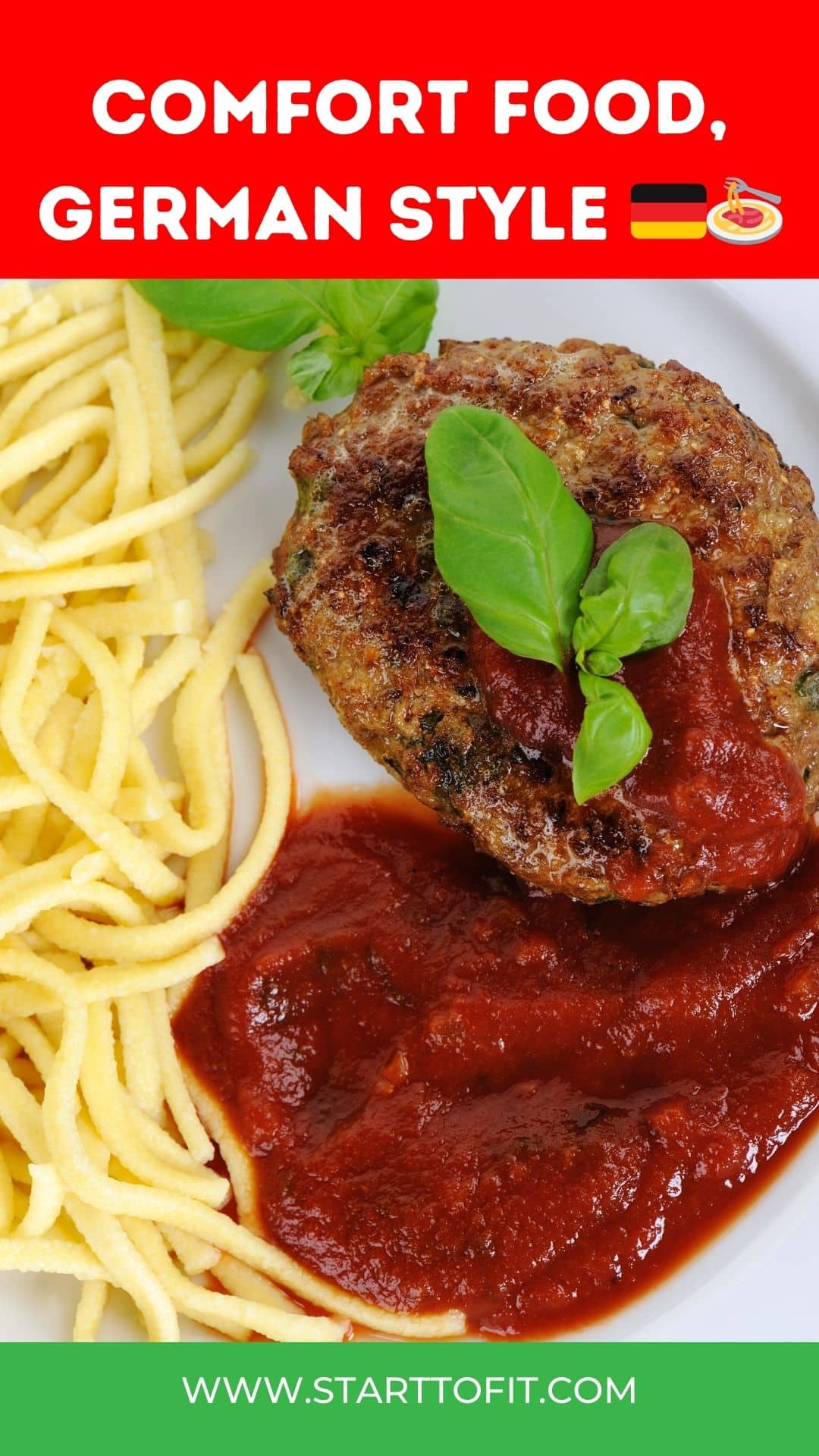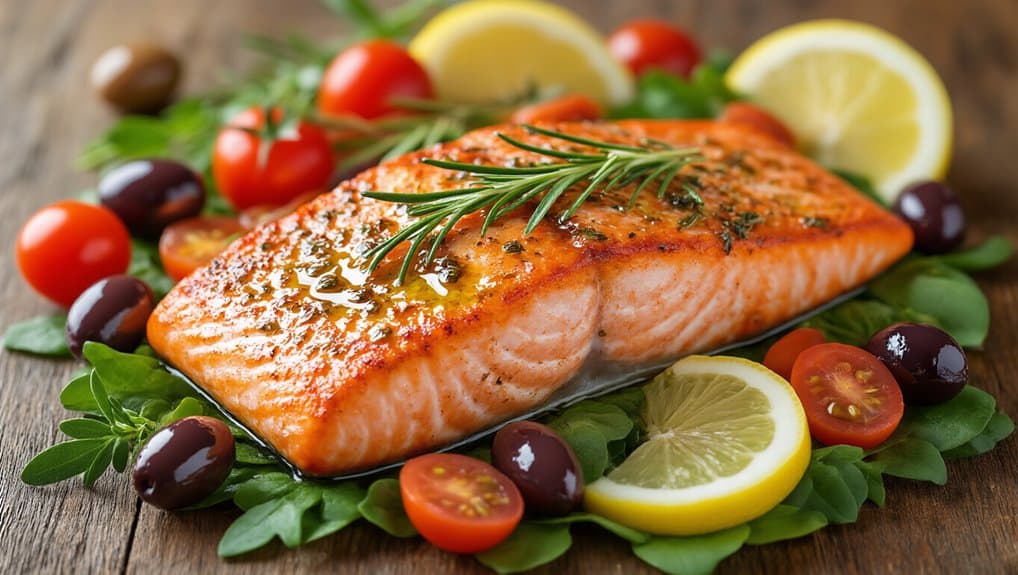
5 Mediterranean Recipes That Prevent Heart Disease
You’ve heard Mediterranean Recipes That Prevent Heart Disease, but do you know which specific recipes deliver the most powerful benefits? The right combination of olive oil, omega-3s, and fiber can dramatically improve your cardiovascular health. What if five simple dishes could strengthen your arteries, reduce inflammation, and lower cholesterol? These aren’t just meals—they’re your defense against heart disease. The science behind each ingredient might surprise you.
Key Takeaway:
- Greek salad with extra virgin olive oil delivers phenolic compounds that protect blood vessels and reduce inflammation.
- Omega-3 rich grilled salmon provides EPA and DHA fatty acids that lower blood pressure and prevent arterial plaque.
- Lentil and white bean stew offers 27 grams of fiber per serving, effectively lowering LDL cholesterol.
- Whole-grain tabbouleh combines soluble fiber and monounsaturated fats to stabilize blood sugar and improve cholesterol profiles.
- Roasted Mediterranean vegetables with olive oil enhance antioxidant absorption, protecting against oxidative stress and atherosclerosis.
Greek Salad With Extra Virgin Olive Oil for Endothelial Function
When you’re looking to protect your heart health through diet, Greek salad with extra virgin olive oil offers a powerful combination that supports your blood vessel function.
The EVOO benefits extend beyond basic nutrition – its phenolic compounds deliver anti-inflammatory and antioxidant properties that directly impact your endothelial health.
While olive oil alone can temporarily reduce flow-mediated dilation by up to 31% after meals, combining EVOO with Greek salad’s antioxidant-rich vegetables changes everything. Research demonstrates that whole grains, fruits, vegetables, and beans in the Mediterranean diet may provide the actual health improvements often attributed to olive oil.
The tomatoes, cucumbers, and onions provide vitamins that counteract fat-induced endothelial dysfunction. Adding balsamic vinegar to your dressing preserves vasodilation even better.
You’ll maximize cardiovascular protection by choosing EVOO with higher phenol content (around 400 ppm) rather than lower varieties.
This Mediterranean staple improves both microvascular and macrovascular function, reducing inflammation at the endothelial level.
Regular consumption of this classic combination has been linked to fewer cardiovascular events and improved arterial health markers across diverse populations.
Omega-3 Rich Grilled Salmon With Mediterranean Herbs
By incorporating omega-3 rich grilled salmon with Mediterranean herbs into your weekly meal plan, you’re giving your cardiovascular system powerful protection against heart disease. The omega-3 fatty acids EPA and DHA in salmon reduce inflammation, lower blood pressure, and decrease triglycerides – all critical factors in preventing cardiovascular disease.
You’ll maximize salmon health benefits by marinating it with Mediterranean herbs like oregano, parsley, and dill. These herbs contain polyphenols and antioxidants that combat oxidative stress and prevent arterial plaque formation. The herb benefits extend beyond flavor – they enhance salmon’s natural heart-protective properties. Rosemary’s distinctive piney flavor not only complements the richness of salmon but also provides additional antioxidants that support cardiovascular health.
For optimal results, marinate your salmon for at least four hours using olive oil, lemon juice, and fresh herbs. Grill it for 4-5 minutes per side at medium-high heat, avoiding charring.
You’ll get approximately 20-25 grams of high-quality protein and 18% of your daily potassium needs from a 3-ounce serving, supporting muscle function and blood pressure regulation.
Fiber-Packed Lentil and White Bean Stew
Transform your heart health with this fiber-packed lentil and white bean stew that delivers an impressive 27 grams of fiber per serving – nearly your entire daily requirement.
You’ll consume just 225 calories while getting 16 grams of protein and essential minerals like iron, calcium, and potassium.
The stew’s nutrient benefits directly target cardiovascular protection. Its high fiber content reduces LDL cholesterol while the 878mg of potassium helps lower blood pressure by counteracting sodium’s effects.
You’re also getting powerful polyphenols from lentils that fight inflammation and protect against atherosclerosis. The combination of green lentils and white kidney beans provides a complete amino acid profile for optimal protein synthesis.
This heart-healthy meal controls blood sugar spikes better than rice or potatoes, improving insulin sensitivity and reducing systemic inflammation.
With no cholesterol and minimal saturated fat, you’re following proven dietary patterns for heart disease prevention.
Each serving provides balanced macronutrients – 39% carbs, 23% fat, and 37% protein – making it a complete, satisfying meal that supports your cardiovascular system.
Check your BMI with the Premium Quality BMI Calculator for Free. Try Now Below.
Whole-Grain Tabbouleh With Fresh Mint and Parsley
You’ll discover that whole-grain tabbouleh delivers exceptional cardiovascular protection through its unique combination of fresh herbs, fiber-rich bulgur wheat, and heart-healthy olive oil. This Mediterranean staple packs powerful health benefits that directly support your heart’s function.
The key nutritional components include:
- Antioxidant powerhouse: Parsley provides more vitamin C than oranges while tomatoes add lycopene for enhanced cardiovascular protection
- Fiber-rich foundation: Bulgur wheat’s soluble fiber actively lowers blood cholesterol and stabilizes blood sugar levels
- Anti-inflammatory oils: Olive oil’s monounsaturated fats reduce LDL cholesterol and systemic inflammation markers
You’re getting multiple protective effects with each serving. The high fiber content promotes satiety for weight management, while fresh mint and lemon juice enhance nutrient absorption.
Various tabouli variations let you customize ingredients while maintaining core cardiovascular benefits. Regular consumption supports healthy cholesterol profiles and reduces heart disease risk factors through the synergistic action of antioxidants, fiber, and healthy fats working together.
Roasted Mediterranean Vegetables Drizzled With Olive Oil
While whole-grain tabbouleh offers outstanding cardiovascular protection through its fresh herbs and fiber, roasted Mediterranean vegetables take a different approach to heart health by concentrating nutrients through heat and enhancing absorption with olive oil.
When you roast tomatoes, peppers, zucchini, and garlic, you’re creating powerful roasted vegetable benefits through caramelization. This process intensifies flavors while preserving antioxidants like vitamin C and beta-carotene. The heat breaks down tomato cell walls, making lycopene more available for your body to absorb.
| Vegetable | Heart-Healthy Compound |
|---|---|
| Tomatoes | Lycopene |
| Garlic | Allicin |
| Peppers | Vitamin C |
| Zucchini | Potassium |
The olive oil advantages multiply these effects. Extra-virgin olive oil’s monounsaturated fats lower LDL cholesterol while its polyphenols reduce inflammation. When you drizzle it over roasted vegetables, you’re enhancing absorption of fat-soluble antioxidants. This combination protects against oxidative stress and atherosclerosis, making it a delicious defense against heart disease.


Check How Much Water you should drink with the Premium Quality Water Intake Calculator for Free. Try Now Below.
FAQs About Mediterranean Recipes That Prevent Heart Disease
Can I Follow the Mediterranean Diet if I’m Vegetarian or Vegan?
Yes, you can absolutely follow the Mediterranean diet as a vegetarian or vegan!
It’s naturally plant-based, focusing on fruits, vegetables, whole grains, legumes, nuts, and seeds.
You’ll get plenty of plant-based proteins from beans, lentils, and chickpeas.
Mediterranean staples like olive oil, nuts, and fresh produce form the diet’s foundation.
Simply skip the fish and meat, and if you’re vegan, exclude dairy products too.
How Long Before I See Cardiovascular Benefits From Mediterranean Eating?
You’ll notice cardiovascular improvements on different Mediterranean timeline markers.
Within 2-3 months, you’ll see better blood pressure and insulin sensitivity.
After 6 months to 1 year, significant heart health benefits emerge.
Long-term adherence brings the most dramatic results – studies show 47% lower heart disease risk after 10 years.
While some biomarkers improve within weeks, you’ll need sustained commitment for major cardiovascular protection.
Is the Mediterranean Diet Safe for People Taking Heart Medications?
You’ll find the Mediterranean diet generally safe with heart medications, but you’ll need some dietary adjustments.
While this eating pattern can reduce your medication needs over time, certain foods require caution.
You should maintain consistent vitamin K intake if you’re on warfarin, avoid grapefruit with some cholesterol drugs, and consult your healthcare provider about balancing Mediterranean foods with your specific heart medications for optimal safety and effectiveness.
What’s the Recommended Portion Size for Mediterranean Diet Meals?
For proper portion control in Mediterranean diet meal planning, you’ll want to fill half your plate with vegetables (1 cup raw or ½ cup cooked per serving).
Add 3-4 ounces of fish or poultry (about a deck of cards), and include ½ cup of whole grains or starchy vegetables.
Don’t forget to drizzle about 1 tablespoon of olive oil per meal.
You should aim for 4+ vegetable servings and 2-3 fruit servings daily.
Can Children Follow the Mediterranean Diet for Heart Disease Prevention?
Yes, you can help your children follow the Mediterranean diet for heart disease prevention.
Research shows it’s beneficial for children’s health, reducing blood pressure, triglycerides, and LDL cholesterol.
You’ll want to focus on fruits, vegetables, whole grains, fish, and olive oil during family meals.
Skip the wine component for kids.
In conclusion, you’ve now got five powerful Mediterranean Recipes That Prevent Heart Disease while delighting your taste buds. By incorporating these dishes into your weekly routine, you’re giving your cardiovascular system the nutrients it craves – from omega-3s and fiber to antioxidants and healthy fats. Start with one recipe this week, then gradually add more. Your heart will thank you for embracing this delicious, scientifically-backed approach to preventing heart disease through Mediterranean cuisine.
Table of Contents














No Comments